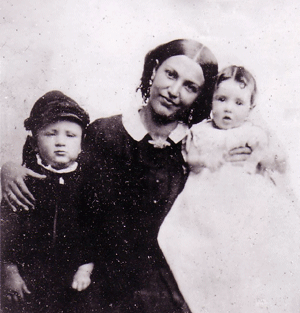Death of pioneer Fanny Brooks
When after many arduous journeys, Isabella (Fanny) Brooks finally found a home for her Jewish family of six, it was in an unlikely place—Mormon-dominated Salt Lake City, Utah. There the family prospered economically and personally, in large part through the efforts of this indomitable Jewish pioneer.
Born in 1837 in a small German village, Fanny Bruck was unusually well educated for a girl, graduating school with high honors. She met Julius Brooks, who had returned from the Gold Rush in California, with stories that fascinated the 15-year-old. She asked him to take her back to America with him, so they married in 1853 and set off for the New World, with Fanny playing French and German folksongs for their shipmates on her guitar.
They stayed only briefly in New York City before heading to Galena, IL, where they joined a train of 100 wagons bound for California. Her story of the journey was later told by their daughter Eveline Brooks Auerbach, who recounted tales of dusty heat, flooded roads, and the poor cooking of their Yankee travelling companions. The family stopped for a few months in Salt Lake City but pressed on to Marysville, CA, where they opened a store. Over the next 10 years, the growing family moved to San Francisco, Portland, Boise, and many small towns. Finally they settled down permanently in downtown Salt Lake City, sandwiched between the stables of the Pony Express Company and a gambling saloon.
Fanny had ambitions of her own. She opened a boarding house, with a dining room that seated up to 40 people at a time. The business prospered, but was threatened by an 1868 edict from Brigham Young forbidding Mormons from doing business with non-Mormons. Mormon merchants put an all-seeing-eye sign with the inscription “Holiness to the Lord” over the entrance to their stores to indicate their religious affiliation. Where other non-Mormon businesses sold out and left town, Fanny Brooks demanded a meeting with Young to make her case. She described to the Mormon leader how much time and effort she and her family had spent building their business and her desire to stay in her adopted hometown. Making an exception in the Brookses’ case, the church leader remained on good terms with the family and was supportive of their Jewish faith to the extent of donating land for a Jewish cemetery.
Encouraged by their acceptance, the Brookses’ opened a millinery shop. Julius purchased the merchandise; Fanny managed the accounts and ran the store. By 1879, Julius had built an elegant European-style shopping mall named the Brooks Arcade. Having prospered in their western home, the Brooks travelled to Europe and often returned to Germany to visit family and friends. On August 21, 1901, Fanny Bruck Brooks died in the town in which she was born, leaving behind a legacy as a skilled businesswoman and an active Jewish citizen of Utah.
She and her husband are buried in the Jewish section of the Salt Lake City Cemetery.
Sources: Frontier Reminiscences of Eveline Brooks Auerbach, Berkeley: Friends of the Bancroft Library, University of California, 1994; Jewish Pioneers, Utah Division of State History; “Businesswoman Fanny Brooks Helped Establish the Jewish Community in Utah,” Utah History to Go.




Fascinating story. I live in Salt Lake and had never heard about this. Many thanks